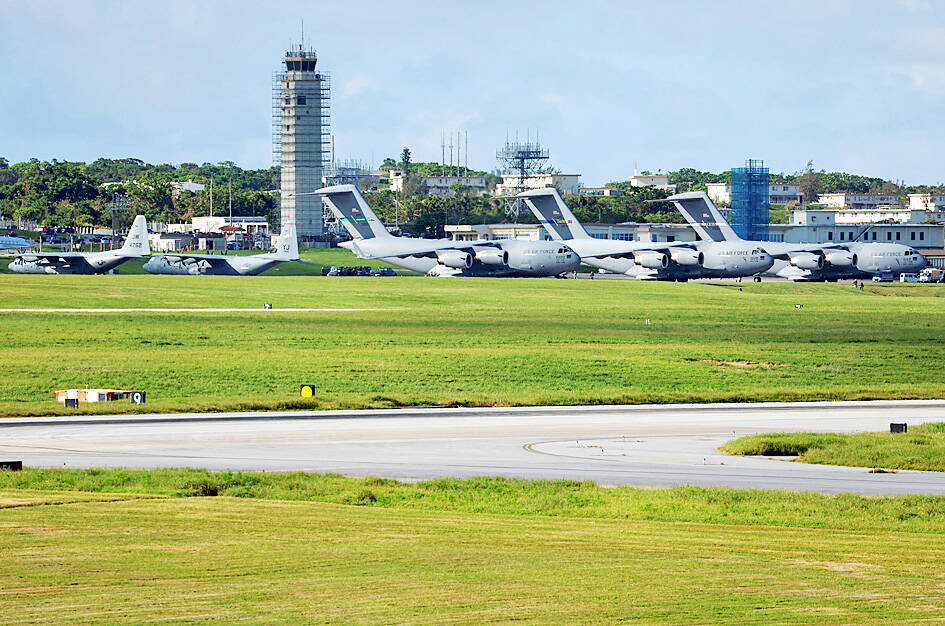A relative lack of airbase fortifications by the US in the Indo-Pacific region has created an imbalance that favors China, according to a report published on Tuesday last week by Washington-based think tank the Hudson Institute.
If the US does not invest resources in hardening its airfields, it would struggle to respond to a potential conflict in the Taiwan Strait, according to the report “Concrete Sky: Air Base Hardening in the Western Pacific,” written by Thomas Shugart and Timothy Walton.
Since the early 2010s, China’s People’s Liberation Army (PLA) has more than doubled its aircraft shelters, allowing it to hide the “vast majority” of its combat aircraft, the report said.

Photo: Reuters
Not only does the PLA have more than 3,000 aircraft shelters, but it has increased its nationwide ramp area by almost 75 percent, it said.
US efforts to expand aircraft shelters and ramp areas have been comparatively modest, the report said.
“Combined US, allied and partner military airfield capacity within 1,000 nautical miles [1,852km] of the Taiwan Strait is roughly one-third of PRC’s [People’s Republic of China],” it said.
This imbalance in airbase infrastructure means China would require much fewer munitions to neutralize US, allied and partner airfields than the converse, the report said.
The imbalance is approximately 25 percent if the US utilizes airfields in Japan, the Philippines, South Korea and Taiwan, and as high as 88 percent if only airfields in Japan are used, it said.
Although the US has adopted the “Agile Combat Employment” strategy to disperse air force operations, much more is needed to ensure the safety of its aircraft in the face of modern precision missile threats, the report said.
The report outlines three specific initiatives the US should pursue to regain its advantage.
First, the US should continue to improve its offensive ability to encourage China to continue allocating funds to defensive measures, the report said.
Second, the US should comprehensively harden airfield infrastructure through a multi-year campaign, building more aircraft shelters and expanding airfields, it said.
Third, the US should evolve its air force to include more long-range and endurance aircraft that can “spend more time in the air rather than on the ramp — where they are easier targets,” it said.
However, improving airfield resilience is still essential, as the US “cannot hope future military forces will address its current airfield weaknesses,” it added.
The report also recommends shifting resources from ground forces to air defense artillery, with the army potentially providing air defenses to the air force and navy.
The US should act immediately to allocate the appropriate military forces and harden its infrastructure, otherwise it would be at a disadvantage in future conflicts, the report said.

An essay competition jointly organized by a local writing society and a publisher affiliated with the Chinese Communist Party (CCP) might have contravened the Act Governing Relations Between the People of the Taiwan Area and the Mainland Area (臺灣地區與大陸地區人民關係條例), the Mainland Affairs Council (MAC) said on Thursday. “In this case, the partner organization is clearly an agency under the CCP’s Fujian Provincial Committee,” MAC Deputy Minister and spokesperson Liang Wen-chieh (梁文傑) said at a news briefing in Taipei. “It also involves bringing Taiwanese students to China with all-expenses-paid arrangements to attend award ceremonies and camps,” Liang said. Those two “characteristics” are typically sufficient

A magnitude 5.9 earthquake that struck about 33km off the coast of Hualien City was the "main shock" in a series of quakes in the area, with aftershocks expected over the next three days, the Central Weather Administration (CWA) said yesterday. Prior to the magnitude 5.9 quake shaking most of Taiwan at 6:53pm yesterday, six other earthquakes stronger than a magnitude of 4, starting with a magnitude 5.5 quake at 6:09pm, occurred in the area. CWA Seismological Center Director Wu Chien-fu (吳健富) confirmed that the quakes were all part of the same series and that the magnitude 5.5 temblor was

The brilliant blue waters, thick foliage and bucolic atmosphere on this seemingly idyllic archipelago deep in the Pacific Ocean belie the key role it now plays in a titanic geopolitical struggle. Palau is again on the front line as China, and the US and its allies prepare their forces in an intensifying contest for control over the Asia-Pacific region. The democratic nation of just 17,000 people hosts US-controlled airstrips and soon-to-be-completed radar installations that the US military describes as “critical” to monitoring vast swathes of water and airspace. It is also a key piece of the second island chain, a string of

The Central Weather Administration has issued a heat alert for southeastern Taiwan, warning of temperatures as high as 36°C today, while alerting some coastal areas of strong winds later in the day. Kaohsiung’s Neimen District (內門) and Pingtung County’s Neipu Township (內埔) are under an orange heat alert, which warns of temperatures as high as 36°C for three consecutive days, the CWA said, citing southwest winds. The heat would also extend to Tainan’s Nansi (楠西) and Yujing (玉井) districts, as well as Pingtung’s Gaoshu (高樹), Yanpu (鹽埔) and Majia (瑪家) townships, it said, forecasting highs of up to 36°C in those areas